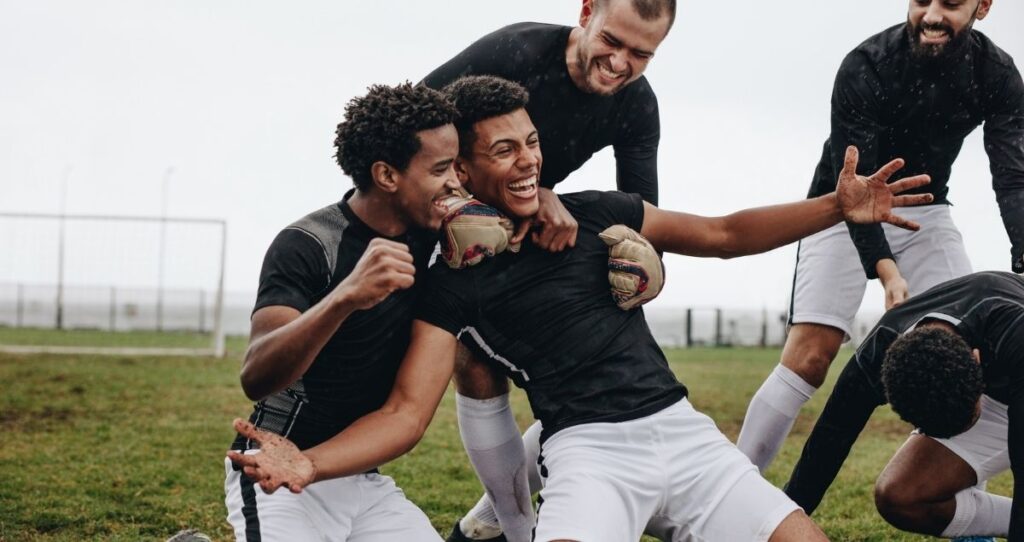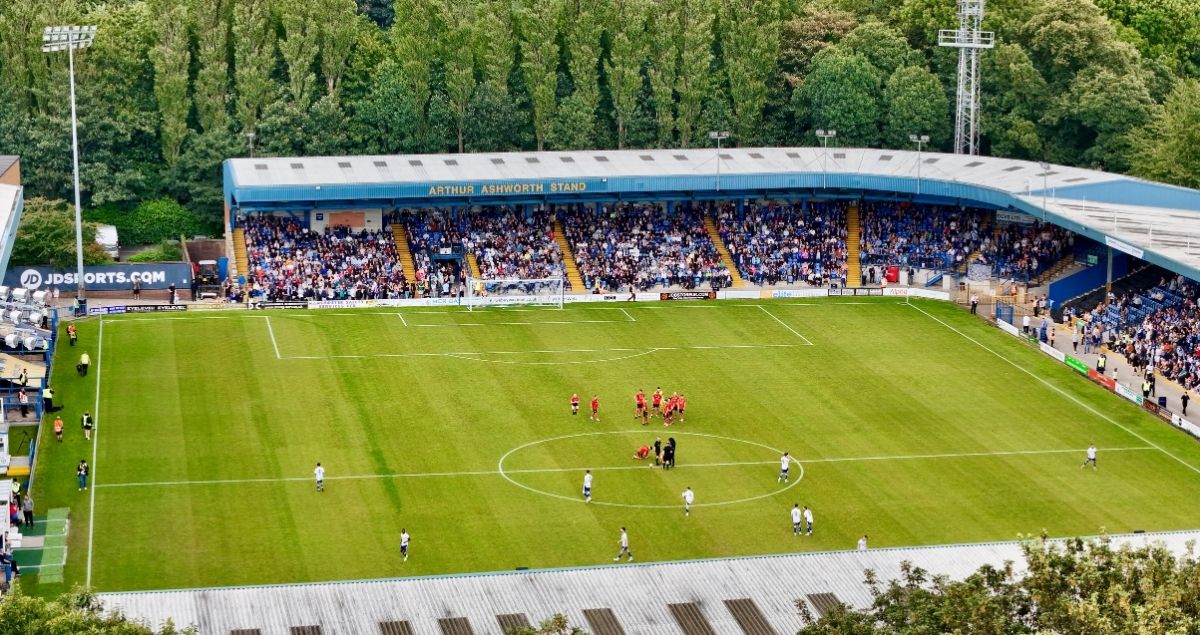Boost your betting experience and get up to $200 bonus right now!
In the vibrant tapestry of global football, the Bundesliga stands out not just for the skill displayed on the pitch but for a rich culture woven deeply into the fabric of German society. From the electrifying chants echoing through stadiums like Borussia Dortmund’s iconic Yellow Wall to the steadfast loyalty seen in clubs like Bayern Munich and Schalke 04, the league exemplifies football’s power to unite and inspire. Far beyond the final whistle, Bundesliga traditions shape fan identities, influence community values, and challenge the commercial norms seen in other leagues worldwide. With a commitment to affordability, fan ownership, and social activism, German football offers a blueprint that impacts both the local and global football community. In a world where football can sometimes feel driven solely by money and media, the Bundesliga preserves an authentic spirit of the game, creating stories and legends that echo from Werder Bremen’s passionate crowds to the historic stands of FC Köln and Hertha Berlin.

Sommaire
ToggleHow German Fan Culture Shapes Unrivaled Matchday Experiences in Bundesliga
Few football scenes around the world can rival the electric atmosphere created by German supporters. The Bundesliga isn’t just about 90 minutes of football; it’s a cultural feast that marries tradition with unyielding passion. At the heart of this experience is the principle of fan involvement, supported strongly by the 50+1 rule. This unique regulation ensures clubs remain majority-owned by their members—meaning the fans are not just spectators but active governors of their teams.
This democratic structure nurtures an unparalleled sense of belonging. Unlike the superstar-studded, corporate-driven spectacles seen elsewhere, Bundesliga fans sustain their clubs through thick and thin, creating stadiums that breathe life and history. Take the Yellow Wall at Borussia Dortmund’s Signal Iduna Park, where 25,000 standing fans make up Europe’s largest terrace. This vibrant congregation symbolizes the soul of German fan culture—loud, colorful, and fiercely loyal.
And it’s not just the large clubs producing these traditions. Clubs like Eintracht Frankfurt and VfB Stuttgart also foster intense support with their own unique chants, banners, and rituals that speak to local identity and pride. Each matchday offers a communal event where inclusivity meets fervor: families, students, workers—all united.
- Affordable ticket prices, as low as €15.20 for top-flight matches, keep the stands accessible to all classes of fans, preserving diversity in attendance.
- “Safe standing” areas allow fans to engage more dynamically while maintaining security, enhancing the fan experience notably compared to many other leagues.
- Alcohol consumption in the stands, especially the cost-effective beer sales, contributes to the traditional festive environment that fuels community spirit.
- Fan protests and displays safeguard social values, addressing racism, sexism, and other societal challenges with visible banners and demonstrations.
Unlike other football cultures where commercialization often alienates the core supporters, Bundesliga clubs pride themselves on maintaining traditions that keep fans at the center, fostering an environment where emotional connections thrive. This ethos also influenced setbacks in football politics—such as the successful ban of Monday night matches after widespread fan uproar, showcasing how supporters wield actual power within the league’s structure.
The 50+1 Rule: Maintaining Fan Power over Football Giants
The 50+1 rule stands as a fortress guarding Bundesliga clubs against full corporate control. Enacted to ensure that members retain majority ownership, it prevents outside investors from taking over clubs like Bayern Munich and Borussia Dortmund—powerhouses with vast global reach. Exceptions exist, such as Wolfsburg, backed by Volkswagen, and Bayer Leverkusen with its roots in Bayer AG, but even cases like RB Leipzig reveal the complexities and fan resistance around commercial investment.
Supporters’ unions like Unsere Kurve have historically campaigned to protect this rule fiercely. Their argument is simple yet profound: football must remain a community-driven enterprise rather than a corporate spectacle. Maintaining such a rule preserves the game’s soul, allowing fans to influence club values, decisions, and cultural direction.
| Club | Ownership Type | Fan Involvement Level | Unique Fan Tradition |
|---|---|---|---|
| Bayern Munich | Majority Fan-Owned | Very High | Tifo displays showcasing German pride |
| Borussia Dortmund | Majority Fan-Owned | Very High | The Yellow Wall – Largest standing terrace in Europe |
| RB Leipzig | Corporate-Controlled | Low | Small, selected fan base with heavy branding |
| Eintracht Frankfurt | Fan-Owned | High | Intense ultras supporting local culture |
| Schalke 04 | Fan-Owned | Very High | The Kloppo-era spirit and Ruhr valley pride |
Fan culture, backed by institutional rules like 50+1, sets apart German football and prevents the alienation experienced elsewhere, giving supporters genuine control in shaping their club’s destiny.
Bundesliga’s Role in Strengthening Local Economies and Community Identity
The Bundesliga is a pillar of economic and social vitality across German cities and towns. Clubs such as VfB Stuttgart and Werder Bremen act as catalysts for more than just football bouts—they drive employment, support local businesses, and act as community hubs.
On matchdays, the influx of supporters boosts local economies—fans flooding nearby restaurants, bars, and transport services. This ripple effect fosters a symbiotic relationship where the club’s health directly benefits its locale. The Bundesliga’s commitment to keeping ticket prices affordable ensures these economic benefits remain accessible to a broad spectrum of supporters, reinforcing their personal connection to the club and region.
Furthermore, Bundesliga clubs often serve as ambassadors for community spirit through social responsibility projects. From youth programs to charity events, these efforts knit football firmly into the social fabric of their areas.
- Youth engagement: Programs linked with schools promote physical activity and healthy lifestyles among children in clubs like FC Köln and Hertha Berlin.
- Charity initiatives: Teams regularly organize matches and events supporting local causes, strengthening community bonds.
- Infrastructure investments: Stadium expansions and improvements bring lasting benefits, enhancing city pride and identity.
- Fans’ social activism: Groups like those supporting Schalke 04 have championed causes such as anti-racism and community inclusion for decades.
This economic and social interplay turns Bundesliga clubs into more than sports entities; they become cornerstones of regional identity and pride, uniting diverse populations around a shared passion.
| Economic Impact | Example | Community Benefit |
|---|---|---|
| Job Creation | Employment in club staff, merchandise sectors | Stable job market for locals |
| Local Business Support | Increased spending on matchdays (restaurants, pubs) | Boosted revenue for small businesses |
| Social Programs | Youth outreach and anti-discrimination initiatives | Enhanced social cohesion |
| Infrastructure | Stadium refurbishments | Modernized community spaces |
Youth Development Systems Powering Bundesliga’s Bright Future Stars
Bundesliga clubs are renowned for prioritizing youth development, serving not only as training grounds for future stars but also as community assets fostering personal growth. Clubs like Hertha Berlin and Hamburger SV have robust academies that emphasize education alongside athletic prowess, embodying a holistic approach to nurturing young talent.
These academies are incubators of both skill and character, with coaching clinics focusing on mental toughness, teamwork, and respect—values that extend far beyond the pitch. Nutritional education and fitness workshops prepare youths for the physical demands of professional football, while mentorship links promising youngsters with seasoned players.
The impact of these programs is evident in rising numbers of players making top-flight debuts at younger ages. Recent data show a consistent rise in Bundesliga debuts by under-21 players, pointing to a successful conveyor belt of talent into clubs ranging from Borussia Mönchengladbach to VfB Stuttgart.
- Coaching clinics improving technical and tactical understanding
- Educational programs emphasizing healthy lifestyles
- Personal mentorship enhancing leadership and resilience
- Pathways enabling smooth progression from grassroots to professional levels
| Year | Players Debuting Under 21 | Clubs with Certified Youth Academies |
|---|---|---|
| 2021 | 45 | 18 |
| 2022 | 50 | 19 |
| 2023 | 55 | 20 |
These youth development systems not only fuel Bundesliga’s competitive edge but also underscore the league’s commitment to long-term sustainability—giving young players from all walks of life a shot at greatness.
How Bundesliga Academies Compare on the Global Stage
Bundesliga clubs consistently rank among Europe’s leaders for homegrown talent production. When compared with other top leagues, German academies benefit from:
- Strong community club ties supporting player integration
- Investment in coaching and educational infrastructure
- Emphasis on a balanced approach combining sport and schooling
These factors place the Bundesliga in the spotlight not just for thrilling matches but for molding football’s next-generation leaders, increasingly sought-after in global transfers, as explored in quiet football transfer strategies.
Global Influence: Bundesliga’s Expanding Role in Shaping International Sports Culture
In today’s interconnected world, the Bundesliga’s traditions and values resonate far beyond Germany’s borders. Globally broadcast in over 200 countries, the league serves as a global ambassador for German sportsmanship and community-oriented football culture.
The league’s outreach extends to collaborative youth programs abroad, cultural exchange tournaments, and environmental sustainability initiatives that integrate football with social responsibility. These dimensions highlight Bundesliga’s role not merely as a sporting competition but as a cultural phenomenon influencing international attitudes towards sports.
- International broadcasting brings Bundesliga’s vibrant fan culture and competitive drama into living rooms worldwide.
- Collaborations with clubs across continents foster mutual learning and promote sport as a tool for social cohesion.
- Community projects engage marginalized groups globally, showing football’s power to unite diverse populations.
- Sustainability initiatives championed by clubs echo growing global concerns about sports’ environmental impact.
The Bundesliga’s influence also feeds back into Germany by enhancing national pride and inspiring youths through exposure to global football narratives. The league catalyzes broader participation not only in football but in general physical fitness and community engagement, enriching German sports culture as a whole.
| Global Initiative | Impact | Example |
|---|---|---|
| International Broadcasts | Increased global viewership | Matches aired in 200+ countries |
| Youth Football Programs | Development of young talent worldwide | Partnerships with academies in Africa and Asia |
| Cultural Exchange Events | Promotion of football values globally | Friendly matches with international clubs |
| Environmental Campaigns | Sports sustainability leadership | Green initiatives by clubs like FC Köln |

Fan Activism and Social Responsibility: Traditions That Transcend Football
The Bundesliga’s impact goes beyond football tactics and results; it engages deeply with social issues, reflecting the values of its fanbase and society at large. Fan groups have long been a driving force behind stands against racism, fascism, and discrimination. Clubs actively support these campaigns, embedding social responsibility into their core policies.
Unlike mere lip service, Bundesliga clubs and their supporters take visible action—supporter banners, inclusive chants, and community programs form a bedrock of ongoing social activism. This culture of activism was crucial in confronting and reducing fascist behaviour in the 1990s, showing football as a platform for societal change rather than division.
- Organized anti-racism initiatives supported by clubs like Hamburger SV
- Fan-led campaigns opposing homophobia and sexism throughout Bundesliga stadia
- Collaborations with government and NGOs to promote inclusion and education
- Protests that have successfully influenced league policies like ending unpopular Monday night matches
This powerful engagement underscores how Bundesliga traditions inspire football culture as a broader social movement—one where passion serves a purpose and the stadium becomes a forum for progress and dialogue.
Our fastest-ever players 🔥#Bundesliga | #BundesligaMatchFacts | @AWSCloud pic.twitter.com/Uh449d7gxe
— Bundesliga English (@Bundesliga_EN) September 4, 2024
Join today and grab up to $200 bonus for your next bets!
Content assisted by AI. This article was created in whole or in part with the help of artificial intelligence.


